Mirella Sichirollo Patzer's Blog, page 53
July 22, 2011
Isabella Marie Boyd (Belle Boyd)
 Isabella Marie BoydMay 9, 1844 – June 11, 1900
Isabella Marie BoydMay 9, 1844 – June 11, 1900I was born in Martinsburg Virginia, the eldest child of Benjamin Reed and Mary Rebecca (Glenn) Boyd. My childhood was idyllic and I lived a care-free life as a reckless tomboy who loved to climb trees, race through the woods, and dominate my brothers, sisters, and cousins. Despite my family's lack of money, I received a good education. After some preliminary schooling, when I was twelve years old, I attended the Mount Washington Female College at Baltimore. I completed my training at the age of sixteen. My family and friends arranged a debut in Washington. Typical of my good nature, I became a fun-loving debutante.
But a career for espionage beckoned and it began quite by chance. On July 4, 1861, a band of Union army soldiers saw the Confederate flag hanging outside my home. They tore it down and hung a Union flag in its place. This angered me, but I kept my silence. But when one of them cursed at my mother, I became completely enraged. I pulled out a pistol and shot the man down.
Although a board of inquiry exonerated me, sentries were posted around my house and officers kept close track of all my activities. I profited from this enforced familiarity, charming at least one of the officers, Captain Daniel Keily, into revealing military secrets to me.
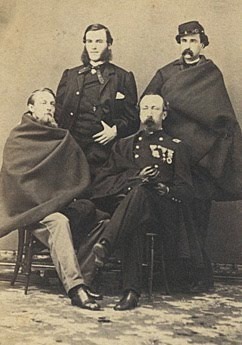 Captain Daniel Kiely is seated on the rightTo him, I am indebted for some very remarkable effusions, some withered flowers, and a great deal of important information." I conveyed those secrets to Confederate officers via my slave, Eliza Hopewell, who carried the messages in a hollowed-out watch case. On this, my first attempt at spying, I was caught and told I could be sentenced to death. Luckily, I was not. This didn't scare me. It only taught me that I needed to find a better way to communicate.
Captain Daniel Kiely is seated on the rightTo him, I am indebted for some very remarkable effusions, some withered flowers, and a great deal of important information." I conveyed those secrets to Confederate officers via my slave, Eliza Hopewell, who carried the messages in a hollowed-out watch case. On this, my first attempt at spying, I was caught and told I could be sentenced to death. Luckily, I was not. This didn't scare me. It only taught me that I needed to find a better way to communicate.One evening in mid-May 1862, Union General James Shields and his staff gathered in the parlor of the local hotel.
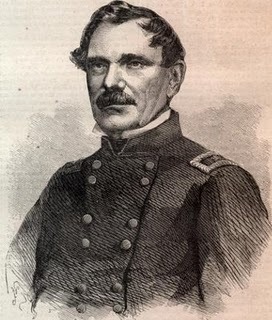 Union General James Shields
Union General James ShieldsI hid in the closet in the room, eavesdropping through a knothole I had enlarged in the door. I learned that Shields had been ordered east from Front Royal, Virginia, a move that would reduce the Union Army's strength at Front Royal. That night, I rode through Union lines, using false papers to bluff my way past the sentries, and reported the news to Colonel Turner Ashby, who was scouting for the Confederates. I then returned to town.
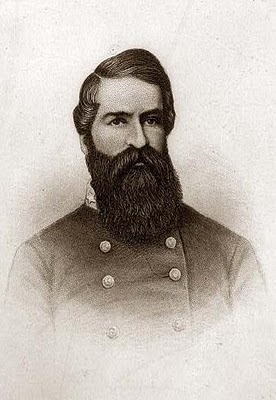 Colonel Turner Ashby
Colonel Turner AshbyWhen the Confederates advanced on Front Royal on May 23, I ran to greet General Stonewall Jackson's men, braving enemy fire that put bullet holes in my skirt.
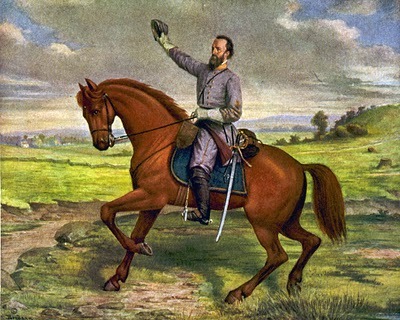 Stonewall Jackson
Stonewall JacksonI urged an officer to inform Jackson that the Yankee force was very small and to tell him to charge right down and he will catch them all. Well, Jackson did just that and that very same evening, he penned a note of gratitude to me. For my actions, I was awarded the Southern Cross of Honor. Jackson also gave me captain and aide-de-camp positions.
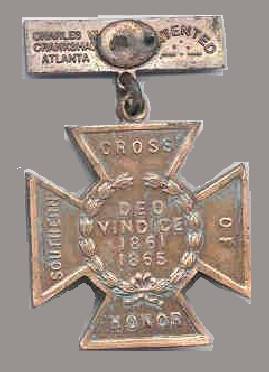
But my lover turned coat and he gave me up. I was arrested on July 29, 1862, and brought to the Old Capitol Prison in Washington on where an inquiry was held on August 7, 1862 concerning violations of orders that I was to have been kept in close custody.
I was held for a month before being released on August 29, 1862, when I was exchanged at Fort Monroe. I was later arrested and imprisoned a third time, but again was set free.
In 1864, I went to England where I met and married a Union naval officer named Samuel Wylde Hardinge.
After the Civil War, I became an actress in England. After my husband, Samuel, died, I returned to the United States on November 11, 1869. There I met and married John Swainston Hammond in New Orleans. But our marriage was not to last. We divorced in 1884 and I married Nathaniel Rue High in 1885. A year later, I began touring the country giving dramatic lectures of my life as a Civil War spy.
While touring the United States, at the age of 56, I suffered a fatal heart attack in Kilbourne City, Wisconsin on June 11, 1900.
My grave can be found in the Spring Grove Cemetery in Dells.









Published on July 22, 2011 07:28
July 20, 2011
Nothing Daunted: The Unexpected Education of Two Society Girls in the West
Life for privileged women during the Victorian era was not always easy. Their days were filled with social calls and tea parties and good books. There were strict societal rules for etiquette and propriety. But life in New York was much, much easier than life for the pioneers who braved the Western frontier.
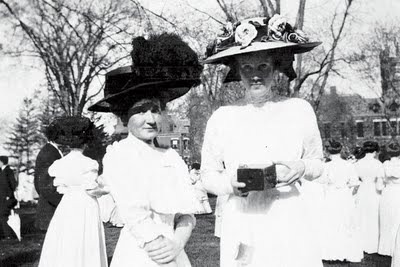
Dorothy Woodruff and Rosamund Underwood were Smith College graduates who were becoming bored with their life. They longed for a bit of adventure and to dedicated their life to practical work that would make a difference. So together, they applied applied to become teachers in the small community of Elkhead, Colorado. They were accepted, and thus, in the summer of 1916, they left their friends, their family, and everything they knew and loved, to travel together to Colorado.
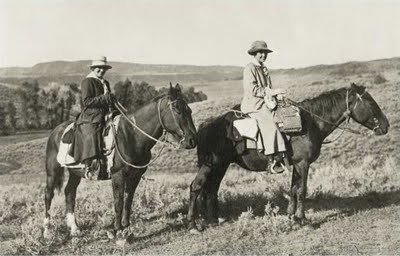
Nearly one hundred years later, Dorothy Wickenden is given her grandmother, Dorothy Woodruff's letters. What the dusty pages of the handwritten pages revealed was fascinating tale of how two courageous young women, travelled West and carved a fruitful life for themselves in the American wilds. She became fascinated with her grandmother's heroic stories and dug deeper into the lives of these fascinating women to write a detailed and factual history of their astounding adventure.
 Nothing Daunted: The Unexpected Education of Two Society Girls in the West by Dorothy Wickenden is a non-fiction book about experiences of these two teachers. What was exceptional about this book was the level of research and detail that went into its writing. The author took the time to delve into lesser known details to really bring to life this era. From train schedules to meals to the characters they met along the way, every detail is brought to life. It is an exceptional look at an era long past and will stand as an inspiring record of two women's courage to face rugged challenges and adversity.
Nothing Daunted: The Unexpected Education of Two Society Girls in the West by Dorothy Wickenden is a non-fiction book about experiences of these two teachers. What was exceptional about this book was the level of research and detail that went into its writing. The author took the time to delve into lesser known details to really bring to life this era. From train schedules to meals to the characters they met along the way, every detail is brought to life. It is an exceptional look at an era long past and will stand as an inspiring record of two women's courage to face rugged challenges and adversity. I LOVE COMMENTS










Published on July 20, 2011 14:42
July 15, 2011
Hoyden of the Week - A peak of thigh!
Published on July 15, 2011 05:59
July 8, 2011
Franca Viola and the battle against La Fuitina
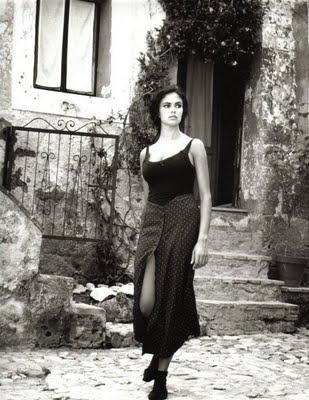 In Sicily, there was a romantic practice called La Fuitina. Young couples in love would secretly run away from home to be together. They would return in a few days, hand in hand, demonstrating to the world that they had been intimate. Of course, the girl's reputation would be in tatters. The only way to repair it was to have the couple repair the damage by marrying, a practice dubbed matrimonio riparatore (reparation marriage). For poor families who could not afford dowries for their daughters, the practice was encouraged by the parents. How very romantic indeed!
In Sicily, there was a romantic practice called La Fuitina. Young couples in love would secretly run away from home to be together. They would return in a few days, hand in hand, demonstrating to the world that they had been intimate. Of course, the girl's reputation would be in tatters. The only way to repair it was to have the couple repair the damage by marrying, a practice dubbed matrimonio riparatore (reparation marriage). For poor families who could not afford dowries for their daughters, the practice was encouraged by the parents. How very romantic indeed!But all that shines is not gold. The practice could also be used for more nefarious purposes. Girls could find themselves unwilling victims. Rejected suitors or unwanted admirers would kidnap the object of their affection then rape her. In this way, he would get the girl and then rely on a reparation marriage to protect him from prosecution. How could this be? Well, according to Article 544 of the Italian Criminal Code, sexual violence was considered an offence against morals and not against the person. Any girl who suffered the disgrace of losing her virginity had little choice – she either submitted to a reparation marriage to restore her honour and that of her family, or she faced a future as a shunned spinster, labeled as a tarnished slut, and would be forever to blame for the violence she had endured.
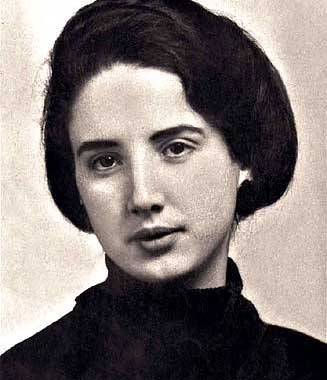
Franca Viola
Franca Viola was a beautiful seventeen year old who lived in the small Sicilian town of Alcamo with her farming family. For many months, Filippo Melodia, a young man with Mafia connections, made advances towards her, which she virtuously and repeatedly discouraged and snubbed. Determined to get his girl, Filippo gathered twelve of his friends and dragged Franca and her younger brother kicking and screaming into a car. They were driven to an isolated farmhouse on the outskirts of town. There, Filippo took her virginity by raping her. Soon afterwards, they released her brother, but kept Franca in seclusion, repeatedly raping her for more than a week. Viola's father pretended to come to terms with the kidnappers while actually collaborating with the Carabinieri police in preparing a successful dragnet operation. After more than a week, Franca Viola was released and her kidnappers arrested
Of course, Melodia offered Franca reparation marriage, for a rapist who married his victim would have his crime automatically extinguished. But Franca courageously refused, acting against what was the common practice in the Sicilian society of the time. According to traditional social code, this choice would make her a donna svergognata, without hounour. This marked the beginning of the family's troubles.
Most of the townfolk ostracized them. Franca's father received death threats. Their family were menaced and persecuted, to the point of having their vineyard and cottage burned to the ground. During Melodia's trial, and that of his accomplices, his lawyers worked hard to discredit Franca, alleging she had encouraged and consented to the fiutina. Thankfully, the judges refused to believe it. Melodia received 11 years imprisonment. Five of his partners in crime were acquitted, and those remaining were given very lenient sentences. Melodia appealed his sentence and it was reduced to 10 years with 2 of those years to be served in Modena.
Franca married her childhood sweetheart and together they had three children. The president of the Italian republic sent them a gift on their wedding day and Pope Paul VI received them in a private audience.
Filippo Melodia was released from prison in 1976. Two years later, he was killed in a mafia-style execution.
The case so beguiled the country that a movie, The Most Beautiful Wife, was made of Franca's story. It brought Franca fame as a national icon for feminism, a status she never took advantage of. The article of law whereby a rapist could extinguish his crime by marrying his victim was abolished ten years later in 1981.
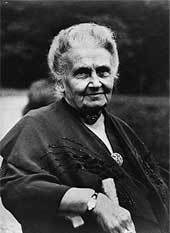
Franca Viola Today
Today, Franca is a grandmother living with her family in Alcamo. When asked to comment on the stance she took against archaic values and behavioural mores, she said, "It was not a courageous gesture. I only did what I felt I had to do, as any other girl would do today. I listened to my heart."
Brava Franca. You helped transform Italian society and led the way for women everywhere to also say "No!"
I LOVE COMMENTS










Published on July 08, 2011 05:59
July 1, 2011
Marie de Vicy-Chamrond, Marquise du Deffand
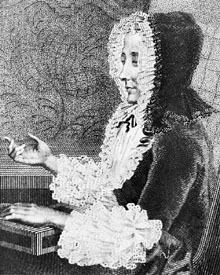 Marie de Vichy-Chamrond, Marquise du Deffand was born in 1697 at Chateau of Chamrond, Burgundy, France.
Marie de Vichy-Chamrond, Marquise du Deffand was born in 1697 at Chateau of Chamrond, Burgundy, France.The Marquise du Deffand is best known for her sharp wit and her bad characer among the French salonnières. She was also known for her ascerbic retorts, pride, cynism, selfishness, and rudeness.
Madame du Deffand was also sceptical, sarcastic; feared and hated even in her blind old age for her scathing criticisms.
When the celebrated work of Helvetius appeared he was blamed in her presence for having made selfishness the great motive of human action.
"Bah!" said she, "he has only revealed every one's secret."









Published on July 01, 2011 07:13
June 30, 2011
The Maid by Kimberly Cutter
Back Cover Blurb:
It is the early part of the fifteenth century and the tumultuous Hundred Years War rages on. The French city of Orleans is under siege, English soldiers tear through the countryside wreaking destruction on all who cross their path, and Charles VII, the uncrowned king, has neither the strength nor the will to rally his army. And in the quiet of her parents' garden in Domremy, a twelve-year-old peasant girl, Jehanne, hears a voice that will change her life – and the course of European history.
The tale of Jehanne d'Arc, the saint and warrior who believed she had been chosen by God to save France, and who led an army of 10,000 soldiers against the English, has captivated our imagination for centuries. But the story of Jehanne – the girl – whose sister was murdered by the English, who sought an escape from her violent father and a forced marriage, who taught herself to ride, and fight, and lead, and who somehow found the courage and tenacity to convince first one, then two, then tens, then thousands to follow her, is at once thrilling, unexpected and heart-breaking. Sweeping, gripping and rich with intrigue, betrayal, love and valour. The Maid is an unforgettable novel about the power and burden of faith, and the exhilarating and devastating consequences of fame.
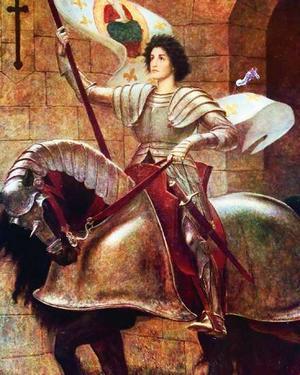
Joan of Arc
From Bloomsbury Publishing comes an exceptional novel of the life of Joan of Arc.
Of all the stories I've read and all the movies I've watched about the life of Joan of Arc, this novel is a most superb rendition of her life. The author's strong third person narrative filled with vivid details and emotions, truly gave me an insight into this heroic woman's very soul. Realistic and heart-wrenching, I could not help but savour every page of this fabulously, well-written novel. Although the story is about a Saint who receives messages and hears voices sent from God, the religious/Christian feel was subtle and did not overpower the story.
The personal willpower and strength of the heroine truly impresses. The author did an exceptional job at depicting Jehanne's convictions despite the prejudices against women during this era. For a young peasant girl to gather an army of military warriors and gain the attention of the king, makes for a poignant story that not only makes the reader rejoice, but grieve at the injustice suffered.
This book has it all - a beautifully written glorious tale of a courageous young woman facing insurmountable odds and her success with tragic results. A must read!
I LOVE COMMENTS










Published on June 30, 2011 09:16
June 28, 2011
The Blighted Troth Book Trailer
Published on June 28, 2011 11:42
June 24, 2011
Hoyden of the Week - A naughty glimpse of panty!
Published on June 24, 2011 17:12
June 16, 2011
Kasturba Gandhi (1869 – 1944)
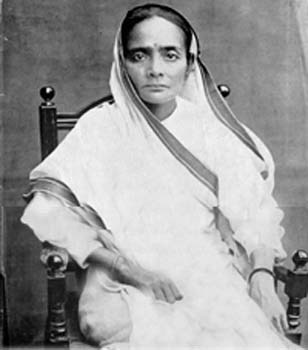
My name is Kasturba Gandhi and I was born in the year 1869, the daughter of a prominent business man. My childhood was uneventful and I was never taught to read or write. When I was thirteen years old, my family arranged a marriage for me to Mohandas Gandhi.
Soon, I bore a son named Harilal. Shortly thereafter, Gandhi departed for London to pursue his education, leaving me in India to raise my son. Between 1892 and 1900 I bore three more sons. I was very dedicated to religion and strongly abhorred the distinction of caste in my Indian society. We lived in an ashram during those early years. It was during this period that I began to support my husband in political protests and worked with at every opportunity. When Gandhi decided to improve working conditions for Indians in South Africa so they would have the power to represent themselves, I joined him in this endeavour and happily accompanied him to South Africa in 1897.
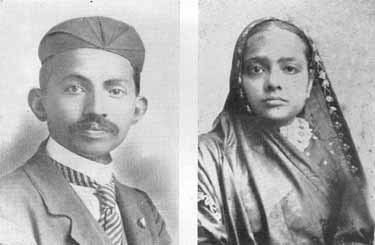 In 1904 I became actively involved in the Phoenix Settlement near Durban. It was during this time that Gandhi decided to practice Brahmacharya and he took the vow of chastity. I approved and also took the vow. We never shared sexual relations again.
In 1904 I became actively involved in the Phoenix Settlement near Durban. It was during this time that Gandhi decided to practice Brahmacharya and he took the vow of chastity. I approved and also took the vow. We never shared sexual relations again. In 1913, I protested against inhuman working conditions of Indians in South Africa. My efforts earned me a three month prison sentence for hard labour. Often, it was my husband who was arrested and when that happened, I always took his place, keeping a close eye upon struggles in India and encouraging women volunteers.
In 1915, I joined Ghandi in support of Indigo planters. There, I encountered many women and children whom I taught to read and write along with her important learnings like personal hygiene and discipline. In this way, I earned respect and the trust of the people I aided.
My self-determination and independent spirit caused many a marital argument. Once, when my husband asked me to contribute more to the running of our ashram and perform some menial tasks, I refused. He became so enraged he nearly threw me out of the home. In the end, I reluctantly agreed, but drew the line at cleaning toilets. That I would never do! We disagreed about the raising of our sons, too, especially because I felt Ghandi neglected them. But my husband firmly believed that his sons should not be entitled to any special privileges. It brought discord into her family, and Harilal, our first born, absented himself from our lives for many years because of it.
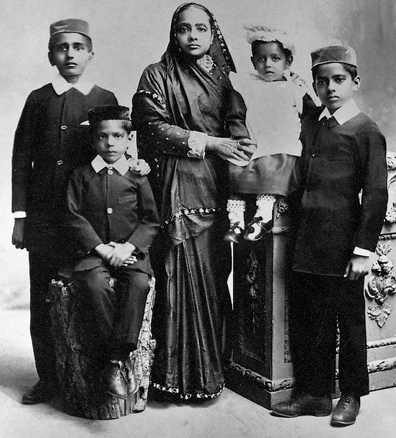 Kasturba and her sons
Kasturba and her sonsI suffered from chronic Bronchitis; a condition exacerbated during my term of imprisonment during the Quit India Movement. Upon my release, I joined my husband in detention at the Aga Khan's Palace in Poona. Ghandi could move his mind from one thing to another, but I was a brooder and could not separate myself from troubles and suffered from stress.
My health began to decline and the bronchitis progressed into pneumonia. The doctors wanted to prescribe penicillin, but Ghandi disagreed. In January 1944, I suffered two heart attacks and was confined to my bed, bearing the pain that refused to go away. Periods of breathlessness kept me from sleep. I asked for permission for an Ayurvedic doctor to see me. But this request was delayed until finally the government allowed a specialist in traditional Indian medicine to treat me. My health improved with the natural treatments and it pleased me that I was healthy enough to sit on the verandah in a wheel chair for brief spells.
But it was not to last and my illness worsened once more. The doctor could do no more for me. My spirits were never so low. I knew these were the final days of my life. One evening, my son, Devdas, took his father and the doctors aside, pleading fiercely that I be given penicillin to save my life. But the doctors told him my condition was fatal. When Ghandi learned that the penicillin had to be administered by injection every four to six hours, he tried to dissuade my son. He argued not to prolong my agony because I could not be cured, but said that he would not stand in the way if that was what my son wanted. In the end, it was decided to abandon the treatment.
My greatest joy during my illness was to see my son Harilal again. When he came to my bedside, I wept tears of joy. And then the end came. Embraced in the arms of my husband, my breathing stopped and forever left this world.
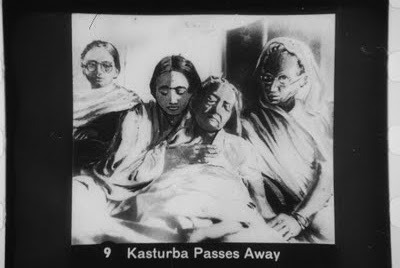
I LOVE COMMENTS





































Published on June 16, 2011 18:40
Kasturba Gandhi (1869 – 1944)

My name is Kasturba Gandhi and I was born in the year 1869, the daughter of a prominent business man. My childhood was uneventful and I was never taught to read or write. When I was thirteen years old, my family arranged a marriage for me to Mohandas Gandhi.
Soon, I bore a son named Harilal. Shortly thereafter, Gandhi departed for London to pursue his education, leaving me in India to raise my son. Between 1892 and 1900 I bore three more sons. I was very dedicated to religion and strongly abhorred the distinction of caste in my Indian society. We lived in an ashram during those early years. It was during this period that I began to support my husband in political protests and worked with at every opportunity. When Gandhi decided to improve working conditions for Indians in South Africa so they would have the power to represent themselves, I joined him in this endeavour and happily accompanied him to South Africa in 1897.
 In 1904 I became actively involved in the Phoenix Settlement near Durban. It was during this time that Gandhi decided to practice Brahmacharya and he took the vow of chastity. I approved and also took the vow. We never shared sexual relations again.
In 1904 I became actively involved in the Phoenix Settlement near Durban. It was during this time that Gandhi decided to practice Brahmacharya and he took the vow of chastity. I approved and also took the vow. We never shared sexual relations again. In 1913, I protested against inhuman working conditions of Indians in South Africa. My efforts earned me a three month prison sentence for hard labour. Often, it was my husband who was arrested and when that happened, I always took his place, keeping a close eye upon struggles in India and encouraging women volunteers.
In 1915, I joined Ghandi in support of Indigo planters. There, I encountered many women and children whom I taught to read and write along with her important learnings like personal hygiene and discipline. In this way, I earned respect and the trust of the people I aided.
My self-determination and independent spirit caused many a marital argument. Once, when my husband asked me to contribute more to the running of our ashram and perform some menial tasks, I refused. He became so enraged he nearly threw me out of the home. In the end, I reluctantly agreed, but drew the line at cleaning toilets. That I would never do! We disagreed about the raising of our sons, too, especially because I felt Ghandi neglected them. But my husband firmly believed that his sons should not be entitled to any special privileges. It brought discord into her family, and Harilal, our first born, absented himself from our lives for many years because of it.
 Kasturba and her sons
Kasturba and her sonsI suffered from chronic Bronchitis; a condition exacerbated during my term of imprisonment during the Quit India Movement. Upon my release, I joined my husband in detention at the Aga Khan's Palace in Poona. Ghandi could move his mind from one thing to another, but I was a brooder and could not separate myself from troubles and suffered from stress.
My health began to decline and the bronchitis progressed into pneumonia. The doctors wanted to prescribe penicillin, but Ghandi disagreed. In January 1944, I suffered two heart attacks and was confined to my bed, bearing the pain that refused to go away. Periods of breathlessness kept me from sleep. I asked for permission for an Ayurvedic doctor to see me. But this request was delayed until finally the government allowed a specialist in traditional Indian medicine to treat me. My health improved with the natural treatments and it pleased me that I was healthy enough to sit on the verandah in a wheel chair for brief spells.
But it was not to last and my illness worsened once more. The doctor could do no more for me. My spirits were never so low. I knew these were the final days of my life. One evening, my son, Devdas, took his father and the doctors aside, pleading fiercely that I be given penicillin to save my life. But the doctors told him my condition was fatal. When Ghandi learned that the penicillin had to be administered by injection every four to six hours, he tried to dissuade my son. He argued not to prolong my agony because I could not be cured, but said that he would not stand in the way if that was what my son wanted. In the end, it was decided to abandon the treatment.
My greatest joy during my illness was to see my son Harilal again. When he came to my bedside, I wept tears of joy. And then the end came. Embraced in the arms of my husband, my breathing stopped and forever left this world.

I LOVE COMMENTS










Published on June 16, 2011 18:40

















